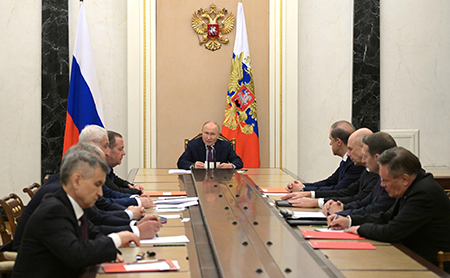"Though we have achieved progress, our work is not over. That is why I support the mission of the Arms Control Association. It is, quite simply, the most effective and important organization working in the field today."
Putin Previews Changes To Nuclear Policy
November 2024
By Xiaodon Liang and Doniyor Mutalov
Russia likely will adopt a nuclear declaratory policy that reserves the right to use nuclear weapons “when the enemy, using conventional weapons, creates a critical threat to our sovereignty,” President Vladimir Putin announced.

In comments before the Russian Security Council on Sept. 25, Putin previewed changes to Russia’s Basic Principles of State Policy on Nuclear Deterrence. The changes are recommendations derived from a yearlong analysis by a cross-ministerial group of specialists, he said.
The new “critical threat” threshold is a departure from the policy adopted in June 2020 in the last revision of Russia’s public nuclear doctrine. The earlier version reserved the right to use nuclear weapons in response to weapons of mass destruction, including nuclear attack, or when a conventional attack means “the very existence of the state is in jeopardy.” (See ACT, July/August 2020.)
In comparison, the Biden administration’s 2022 Nuclear Posture Review adopted the declaratory policy that nuclear use would be reserved for “extreme circumstances to defend the vital interests of the United States or its allies and partners.”
In comments published on Oct. 29 by the Kremlin at the start of annual strategic nuclear forces exercises, Putin emphasized that “the use of nuclear weapons is an extreme, exceptional measure for ensuring state security.” Despite a modernization effort that seeks to “enhance all [strategic forces] components,” Russia does “not intend to be drawn in a new arms race,” he said.
The policy changes previewed on Sept. 25 include an expansion of the conditions under which Russia would transition to the use of nuclear weapons. The June 2020 version of Russia’s nuclear doctrine stated that one of the “conditions specifying” the possible use of nuclear weapons is the “arrival of reliable data on a launch of ballistic missiles.”
Putin announced that, in the future, this condition also would be met by indications of “a massive launch of air and space attack weapons and their crossing our state border,” whether these weapons are “strategic and tactical aircraft, cruise missiles, [unmanned aerial vehicles], [or] hypersonic [or] other aircraft.”
Putin’s Sept. 25 statement added that “aggression against Russia from any non-nuclear state but involving or supported by any nuclear state [would be treated] as their joint attack.” This closely mirrors the exception to Russia’s 1995 general negative security assurance issued to non-nuclear-weapon states.
That exception says that Russia will not use nuclear weapons against non-nuclear-weapon states-parties to the nuclear Nonproliferation Treaty, except in the case of “invasion or any other attack carried out or sustained by such a non-nuclear-weapon state in association or alliance with a nuclear-weapon state.”
The “joint attack” language comes as the United States continues to weigh Ukraine’s request for permission to use U.S.-origin long-range missiles against Russian targets. (See ACT, October 2024.)
Additionally, Putin said in his statement that, “We reserve the right to use nuclear weapons in the event of aggression against Russia and Belarus as a member of the Union State.” In contrast, the 2020 doctrine makes references in several places to allies of Russia, but does not specify Belarus by name.
On Oct. 1, NATO Secretary-General Mark Rutte described Putin’s announcement as “reckless and irresponsible,” but cautioned against overreaction to the rhetoric. “He wants us also to discuss his nuclear arsenal, and I think we shouldn't,” Rutte said at a press conference.
U.S. Secretary of State Antony Blinken referred to Putin’s announced changes to Russia’s doctrine as “totally irresponsible” in a Sept. 26 interview with MSNBC. He predicted that the doctrinal change would “play very badly around the world.”
Thirteen countries self-identified as members of the Global South issued a Sept. 27 joint communique calling for states to refrain “from the use or the threat of weapons of mass destruction, particularly nuclear weapons and chemical and biological weapons.”
The communique, which was supported by China, also called for a settlement of the war in Ukraine.
